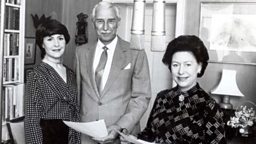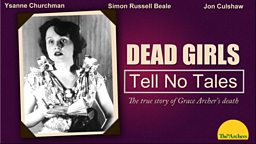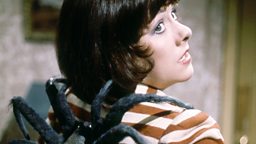Telling The Tales: Lynda's choice of Canterbury pilgrims explained
Lynda Snell’s hopes for the 2018 Ambridge Christmas Show are more ambitious than ever with her adaptation of Geoffrey Chaucer’s The Canterbury Tales (with some help from ).
The context of the Tales is a pilgrimage in 1390, from Southwark in London to the shrine of St Thomas Beckett in Canterbury. Set at a time when England was experiencing an economic shake-up, the first era of the self-made man, they heavily feature class and entitlement.
While on their journey, the pilgrims stop at the Tabard Inn, where their host challenges them to tell stories to win dinner – something that Lynda has replicated with her Tellers; the winner will enjoy Ian’s finest cuisine at Grey Gables.
The pilgrims are a mixed bunch, from religious leaders to tradesmen. Say what you like about Lynda’s directorial style, you can't deny that her casting is excellently pitched.
The Knight's Tale β Told by Kirsty Miller
The feisty Kirsty Miller is the first to entertain us, with The Knight’s Tale. The Knight tells us a tale of chivalry, with two men fighting for the love of a beautiful woman. Shades of Kirsty’s leading men, Tom Archer and Philip Moss, perhaps? And there are echoes of the historical feud between the Grundy brothers, Ed and Will, with Ed and Emma featuring in the telling of this Tale.
The Miller's Tale - Told by Eddie Grundy

Bawdy and deceitful, Eddie Grundy is a shoo-in for the Miller's Tale, which the Miller tells when tipsy. Also a story revolving around a love triangle it's slightly more earthy than the Knight's narrative with more emphasis on the er… physical than the chivalrous. How to seduce a woman when she's the wife of another man? Settle back and listen to the Miller's top tips.
The Wife of Bathβs Tale β Told by Lilian Bellamy
Oh, if anyone was going to be a gin drinker from The Canterbury Tales’ tellers, the Wife of Bath would be it. And thus we have Lilian Bellamy as the good Wife, giving us the low down on her five previous husbands, and answering the age old question, “What do women want?”
This Tale is one of the best known, and the longest. The Wife is described as big and blowsy, and she’s a post-feminist, accepting of her bodily needs for men while lamenting “the wo that is in marriage.”
The Wife of Bath
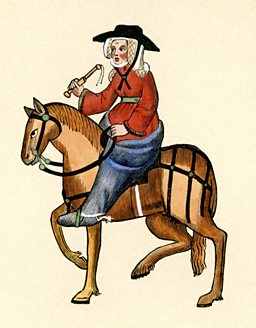
The Sailorβs Tale β told by Jazzer McCreary
Also referred to as "The Shipman's Tale", once again we have a Tale involving sex, with the added bonus this time of money, business and a dislike of the clergy (a common Chaucerian theme). The Sailor is the ultimate bad boy - a well-travelled, charming ruffian, and this story is a kind of pub tall story, featuring a wife who sleeps with a monk in exchange for the money her husband won't give her, who better to tell this tale than Jazzer?
The Pardonerβs Tale β told by Justin Elliott
The Pardoner’s Tale would probably be more suited to Matt Crawford than Justin Elliott, but in the absence of Tiger, Justin will be regaling us with this story of death and trickery. A Pardoner was one who travelled the country selling pardons for sins (usually bits of paper signed by a bishop), and sometimes also holy relics which more often than not turned out to be entirely fraudulent.
Chaucer describes him as not behaving like a “geldyng or a mare” (a man or a woman) and makes great capital of the Pardoner’s shabby practices. The Pardoner’s Tale involves three young men who set out to steal treasure together and end up murdering each other; the Pardoner says the moral of his tale is greed is the root of all evil, clearly a reflection on the Pardoner’s own behaviour (and possibly Justin Elliott’s too!)
The Friarβs Tale β told by Lynda Snell
Naturally Lynda Snell wants her moment in the spotlight, and she's picked The Friar's Tale.
Another unsavoury religious figure, the Friar is a lecherous fraud, who tells a story of a Summoner (another dubious part of the church hierarchy) who meets a demon, tries to extort money from a widow and ends up being sent to hell.
Chaucer used the Tales to highlight church hypocrisy and its function as a self-serving racket, exploiting the naive poor, and both the Friar and the Summoner he talks of are examples of Chaucer's acerbic commentary.
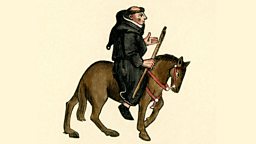
The Franklinβs Tale β told by Jim Lloyd
Although Jim Lloyd would be more comfortable in Latin or Greek than Middle English, he is portraying The Franklin, a landowner of high social status.
This is a love story of an enlightened couple whose egalitarian relationship becomes threatened by another suitor. To discourage him the woman tells her follower that she will marry him if he makes all the rocks on the coast of Brittany disappear. With the aid of "magick" (and the high tide) he does it, and the fiancé says the woman must marry her suitor as he won the task. The suitor however gracefully renounces her in tribute to the strength and honesty of the couple's relationship.
The Bailiffβs Tale - told by Susan Carter
The Bailiff, or Reeve, is a sickly sort of chap, although wealthy, and the most important thing as far as Susan is concerned, a manager. He manages the estate of a wealthy landowner and isn’t above exploiting his position to extract money from those beneath him.
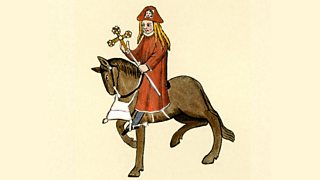
The Bailiff tells the tale of Symkyn, a bullying miller who steals wheat. Symkyn outwits two college students who set about getting their own back by seducing his wife and daughter. Will this persuade Symkyn to mend his ways?
And of course there’s The Host, who organises the tale-telling and attempts to keep peace and order, is portrayed by an unwilling David Archer and his wife Ruth plays Chaucer, who comments on the Tales.
So as the lights dim in the barn at Brookfield and the warm breath of cattle drifts across the yard, settle down and enjoy our favourite amateur dramatics performance of the year.










